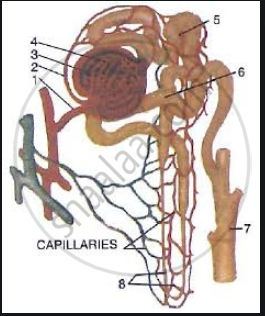Advertisements
Advertisements
प्रश्न
The excretory organs in an earthworm are:
(a) nephridia
(b) nephrons
(c) raphides
(d) ureters
उत्तर
(a) nephridia
In earthworm, the main excretory organs are nephridia. It functions like a kidney.
APPEARS IN
संबंधित प्रश्न
Describe the structure and functioning of nephrons.
the Biological/technical term Pigment providing colour to urine.
The form in which glucose in stored in liver.
the biological/technical terms for the hormone increasing reabsorption of water by kidney tubules
Identify the odd one.
Name the two waste products of the human body which are produced in the body cells.
In which of the following are the largest amounts of nitrogen excreted from a mammalian body?
(a) breath
(b) sweat
(c) urine
(d) faeces
Name the following:
The vein in which urea concentration is maximum
In summer the urine is slightly thicker than in winter explain the reason.
Differentiate between the following pairs of terms:
Bowman’s capsule and malpighian capsule.
Differentiate between the following pairs of term :
Renal cortex and renal medulla
Choose the correct answer:
A condition of failure of kidney to form urea is called ____________
Choose the odd one out in the following series:
Proximal convoluted duct, loop of Henle, vein.
The following diagram represents a mammalian kidney tubule (nephron) and its blood supply.

Parts indicated by the guidelines 1to 8 are as follows:
1. Afferent arteriole from renal artery
2. Efferent arteriole
3. Bowman's capsule
4. Glomerulus
5. Proximal convoluted tubule with blood capillaries
6. Distal convoluted tubule with blood capillaries
7. Collecting tubule
8. U-shaped loop of Henle
Study the diagram and answer the question that follow:
Which structure (normally) contains the lowest concentration of glucose?
Answer the following question:
Explain the human excretory system with the help of a suitable diagram.
Write the functional activity of the following structure:
Glomerulus
Answer the following question.
Amphibian tadpole can afford to be ammonotelic. Justify.
Osmoregulation maintains the osmolarity of blood at about ______.
What is the purpose of making urine in the human body?
Give two examples of the following:
Main excretory organs
